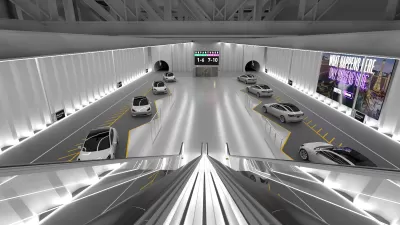The Boring Company had previously said it was working with Tesla to use its self-driving system in its tunnels below Las Vegas to save costs on drivers, but two years later, there is no clear timeline for “full autonomy.”

It’s been a rough couple months for Elon-Musk-related ventures, with Tesla sales falling, X’s financial woes, Brazil banning the social media platform, and news that last year’s SpaceX rocket explosion punched a hole in Earth’s atmosphere. A recent article from Eletrek has called out another: “Tesla’s self-driving system is still not working in The Boring Company’s one-way tunnels under Las Vegas despite reportedly working on it for years,” writer Fred Lambert reports. Las Vegas Convention President and CEO Steve Hill told media that the goal is now to have “some driver assistance tool” used in the Loop by the end of the year, but there is no timeline for “full autonomy,” despite The Boring Company having said it was working with Telsa to use its self-driving system in the tunnels, touting it as a operation-cost reduction measure. So, in the words of a Gizmodo article back in 2021 when the project first opened, it is “still just humans driving cars slowly in a tunnel.”
The Las Vegas Convention Center Loop, which was completed in one year for around $50 million, is The Boring Company’s first full-scale loop project currently in commercial use, Lambert writes. The system consists of tunnels through which Tesla electric vehicles travel at high speeds between stations to transport people within a city. Currently those vehicles are driven by people between three stations at the convention center and one at the Resorts World hotel, with another at the Encore expected to open soon. “Overall, 93 stations and 68 miles of tunnels are planned as part of the Loop under Las Vegas.”
Given the delay in getting Tesla’s self-driving systems working in such a closed, predictable, fixed-route environment, the article expresses some skepticism at industry claims that self-driving in Tesla vehicles on public roads is just around the corner. It concludes with a bit of commentary from Lambert: “I like The Boring Company. Tunnels are a smart solution for increasing transport capacity in urban areas, and if the startup can reduce the cost of tunneling, it’s a net positive overall. However, the way they use the tunnels right now, with drivers transporting a few passengers in Tesla vehicles in those one-way tunnels, doesn’t seem to be the best use. I think as of now, a subway system would be more useful.”
Related Planetizen commentary: Opinion: Stop Trusting Elon Musk—on Tunnels, on Teslas, on Everything
FULL STORY: Tesla’s self-driving is still not working in Boring Company’s one-way tunnels

Planetizen Federal Action Tracker
A weekly monitor of how Trump’s orders and actions are impacting planners and planning in America.

Congressman Proposes Bill to Rename DC Metro “Trump Train”
The Make Autorail Great Again Act would withhold federal funding to the system until the Washington Metropolitan Area Transit Authority (WMATA), rebrands as the Washington Metropolitan Authority for Greater Access (WMAGA).

The Simple Legislative Tool Transforming Vacant Downtowns
In California, Michigan and Georgia, an easy win is bringing dollars — and delight — back to city centers.

The States Losing Rural Delivery Rooms at an Alarming Pace
In some states, as few as 9% of rural hospitals still deliver babies. As a result, rising pre-term births, no adequate pre-term care and harrowing close calls are a growing reality.

The Small South Asian Republic Going all in on EVs
Thanks to one simple policy change less than five years ago, 65% of new cars in this Himalayan country are now electric.

DC Backpedals on Bike Lane Protection, Swaps Barriers for Paint
Citing aesthetic concerns, the city is removing the concrete barriers and flexposts that once separated Arizona Avenue cyclists from motor vehicles.
Urban Design for Planners 1: Software Tools
This six-course series explores essential urban design concepts using open source software and equips planners with the tools they need to participate fully in the urban design process.
Planning for Universal Design
Learn the tools for implementing Universal Design in planning regulations.
Smith Gee Studio
City of Charlotte
City of Camden Redevelopment Agency
City of Astoria
Transportation Research & Education Center (TREC) at Portland State University
US High Speed Rail Association
City of Camden Redevelopment Agency
Municipality of Princeton (NJ)




























